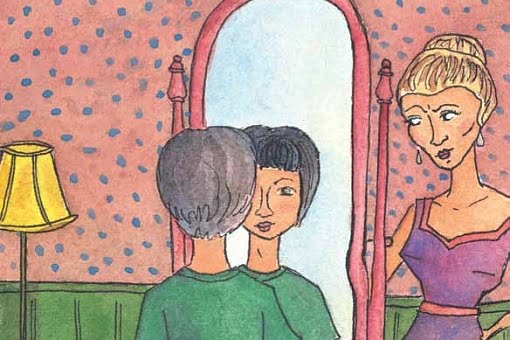There are many things which we tell young girls, which over the years of their development become the cause of what Colette Dowling calls the Cinderella Complex. The Cinderella Complex is the idea that women have a hidden fear of independence and thus depend on men economically, financially, physically and psychologically. However, it is not enough to recognise this gradual submission of women, but we also need to identify and stop how we contribute to this. Here is a list of just four things we should not tell young girls:
1. You are so pretty
Most young girls receive this compliment from their parents, relatives, family friends or even from strangers. On the first instance it may seem so innocent, why would it ever be harmful to tell someone they are pretty? However, the answer is more apparent than we think. If we are continually teaching young girls that it is their appearance that is noticed first and foremost, then it gives them the powerful message that their looks are their most valuable asset. In a country so obsessed with looks do we need the future generations to also follow on this age-long tradition?
We do not always tell young boys how handsome they are or how cute their clothes are, so why do we reduce girls to such comments? Studies have shown that such comments have an adverse impact on young girls self-esteem. As a result, there is less focus on good characteristics like kindness, humility, generosity.
Also read: Why Do School Dress Codes End Up Sexualising Young Girls?
So what should we strive to say to young girls instead? Perhaps instead of praising them merely on their looks, we can ask them what their interests are. Boys are often asked whether they like cricket or football, what teams they support. Can we not ask girls the same kind of questions.
2. However, you are on your… *pause, look around and whisper* … PERIOD!
Even in today’s day and age in all parts of the world, whether it be in rural or urban settings, being on your period is somewhat stigmatised. Women are made to feel like they are impure and are secluded during their period. Many young girls and even grown women do not want to leave the house or do necessary daily activities when they are on their period. In many communities, girls are prevented from attending ceremonies such as weddings and funerals.
We do not always tell young boys how handsome they are or how cute their clothes are, so why do we reduce girls to such comments?
Periods are not something we can control, but it is something all women have to deal with. Instead of treating it like a weakness, we should deal with it head on and make ourselves stronger. We do not want young girls growing up feeling like they cannot do many things due to being on their periods. As a result, many girls use it as an excuse to justify things like skipping physical education in school (although this does not apply to those who have severe health conditions surrounding or due to their periods).
There is also the issue of access, as last year it was found that only 12 percent of girls in India had access to sanitary products. Many girls end up dropping out of school as a result. This issue lack of access to sanitary products cannot be achieved until society overall is more understanding of this very natural biological cycle. Once the stigma and taboo around periods are lifted, there can be more conversation of reform, which will hopefully lead to actual reform.
3. You need to get married before it is too late
In India and the whole of South Asia, we place the most pressure on women to get married. A man can be seen as an eligible bachelor even at 50 years old, but a woman that is approaching 25 is reaching or has even passed her expiry date. Women are put on a timer, and they must get married before their time is up. We end up raising girls by continually telling them one day they will get married too.
We feed the minds of young girls with an unrealistic idea of marriage, painting a ‘pretty’ Bollywood-fied picture in their minds. However, when they do grow up and realise that life is not a Bollywood movie is causing significant deficiencies in their lives. In India women are told that they need to get married for respect and stability, but why not allow a girl to work hard towards earning that for herself.
We need to stop idealising marriage to young girls and instead steer them towards education and achieving their career aspirations. If a boy needs to get his life sorted before committing to marriage, so should a girl right?
4. You need to be able to make ‘gol rotis’ before marriage
The emphasis on girls needing to learn to cool is heavily based on marriage. However, why is cooking, or any domestic chore, only the responsibility of the women? A man lives in the same house and eats the same food, yet we do not raise our sons telling them how to cook. We tell young girls they have to cook to keep their husband and their in-laws happy. Like this one skill will solve all problems because before this girl had married into the family, the whole family was starving.
I grew up in a household where being the eldest daughter with two younger sons, and I was expected to do certain household chores. I began to question this at a very young age and as a result by the time I reached my teens the dynamics in my house shifted towards everyone in the house putting in equal effort. At present both my parents work however my dad cooks more than my mum, as he is home more often. My brothers also regularly help in the kitchen and do other chores around the house.
We tell young girls they have to cook to keep their husband and their in-laws happy. Like this one skill will solve all problems because before this girl had married into the family, the whole family was starving.
This change was not and cannot be achieved lightly but through intense questioning of gender norms, which prescribe girls to domestic chores while boys are given the liberty of extra free time. Let us not make our brothers and sons lax and inconsiderate by not making them help out in the house. If we teach them to help out and show girls that it is not their sole duty to be burdened with housework, future generations will also be able to inhabit this.
Also read: 8 Things To Do In Order To Raise Feminist Children
We need to treat girls the same way we treat boys from a young age, and in every setting. Especially in an increasingly globalising world like ours, despite her upbringing, a young girl will grow up and know about feminism and equality. So why not instill these values now, so that they are more informed about their possibilities. We should strive towards a world where equality is not something we have to keep struggling for but is embedded deeply in everything.
Featured Image Source: Stone Soup
About the author(s)
Nikhat is a Civil Servant and Communications Manager for BBPC Poetry Collective. Her academic research interests include wartime gender-based violence and intersectional feminist historiography.







My mom never told me these things…why will I teach these things to my daughter? Moreover, your last two points seem quite irrelevant in context of modern urban India, where no mom will ever ask a daughter to have her goals of life as getting married at right age and learn to make round chapatis!
I think what she meant by last 2 points is we somehow enforce girl child to care and learn domestic duties more than boys. making GOL chapatis is symbolic representation.
And there are so many families even in urban places where they ask their daughters to get married at right age (right age is debatable).